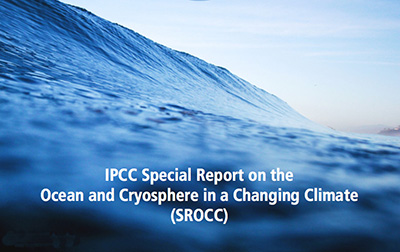Campus News
Climate report describes escalating impacts on oceans, ice, and snow
UCSC ocean scientist Raphael Kudela is a lead author of the IPCC Special Report on the Ocean and Cryosphere in a Changing Climate, which provides new evidence for the benefits of limiting global warming.


The effects of climate change already observed by scientists in recent decades include a doubling in the rate of ocean warming since 1993, increased frequency and intensity of marine heat waves, growing acidification and loss of oxygen in surface waters, changes in marine ecosystems, shrinking ice sheets and glaciers, accelerating sea level rise, and increased flooding and other hazards for coastal communities.
All this and more can be expected to get worse in the coming decades, according to the Special Report on the Ocean and Cryosphere in a Changing Climate released on Wednesday, September 25, by the Intergovernmental Panel on Climate Change (IPCC).
“We have to deal with the fact that climate change is occurring now, and there will be impacts to human society. But if we take action now to reduce greenhouse gas emissions, we can lessen those impacts,” said Raphael Kudela, professor of ocean sciences at UC Santa Cruz and an author of the IPCC Special Report.
Kudela is a lead author of the report’s first chapter, which provides framing and context, and he also reviewed content in other chapters. For this special report, more than 100 scientists from 36 countries assessed the latest scientific knowledge about the impacts of climate change on ocean, coastal, polar, and mountain ecosystems, and the human communities that depend on them.
Contributors to the chapter on ocean ecosystems include Daniel Costa, professor of ecology and evolutionary biology and director of UCSC’s Institute of Marine Sciences (IMS), and Kristy Kroeker, associate professor of ecology and evolutionary biology. IMS research scientist Siddharth Narayan contributed to the chapter on sea level rise and adaptation responses.
Unprecedented and enduring changes
The report on oceans and the cryosphere (meaning parts of the Earth that are frozen) is the third in a series of special reports produced in the IPCC’s Sixth Assessment Cycle. It highlights the urgency of prioritizing timely, ambitious, and coordinated action to address unprecedented and enduring changes in the ocean and cryosphere.
Global warming has already reached 1°C above the pre-industrial level, due to past and current greenhouse gas emissions. There is overwhelming evidence that this is resulting in profound consequences for ecosystems and people. The ocean is warmer, more acidic and less productive. Melting glaciers and ice sheets are causing sea level rise, and coastal extreme events are becoming more severe.
“If we reduce emissions sharply, consequences for people and their livelihoods will still be challenging, but potentially more manageable for those who are most vulnerable,” said IPCC Chair Hoesung Lee in a statement. “We increase our ability to build resilience and there will be more benefits for sustainable development.”
Kudela said the new report’s findings include climate-related changes scientists are seeing now on marine organisms and ecosystems. Warming and changes in ocean chemistry are already disrupting species throughout the ocean food web, with impacts on marine ecosystems and the people who depend on them, the report said.
“We are seeing impacts to biology, such as marine organisms moving toward the poles in response to ocean warming, and that is impacting fisheries,” Kudela said. “The report also finds that harmful algal blooms are clearly increasing because of climate change.”
To date, the ocean has taken up more than 90% of the excess heat in the climate system. By 2100, the ocean will take up 2 to 4 times more heat than between 1970 and the present if global warming is limited to 2°C, and up to 5 to 7 times more at higher emissions. Ocean warming reduces mixing between water layers and, as a consequence, the supply of oxygen and nutrients for marine life.
Sea level rise has accelerated in recent decades due to increasing rates of ice loss from the Greenland and Antarctic ice sheets, as well as continued loss from glaciers and expansion of ocean water as it warms. Increases in tropical cyclone winds and rainfall, and increases in extreme waves, combined with sea level rise, are exacerbating coastal flooding and other hazards. Marine heat waves and extreme El Niño and La Niña events are also projected to become more frequent.
Risks of severe impacts on biodiversity and coastal ecosystems increase under high emissions scenarios, including high risks for sensitive ecosystems such as seagrass meadows and kelp forests. Coral reefs are already at high risk and are projected to be at very high risk even if global warming is limited to 1.5°C.
Although time is running out, it is still possible to lessen many of the projected impacts of climate change, Kudela said. “Under the lower emissions scenarios, the projections are not as bad. But if we wait ten years to take action, the impacts will be that much worse,” he said. “Anything we do now is better than nothing.”
According to the report, which was approved on September 24 by the 195 IPCC member governments, “Enabling climate resilience and sustainable development depends critically on urgent and ambitious emissions reductions coupled with coordinated sustained and increasingly ambitious adaptation actions.”